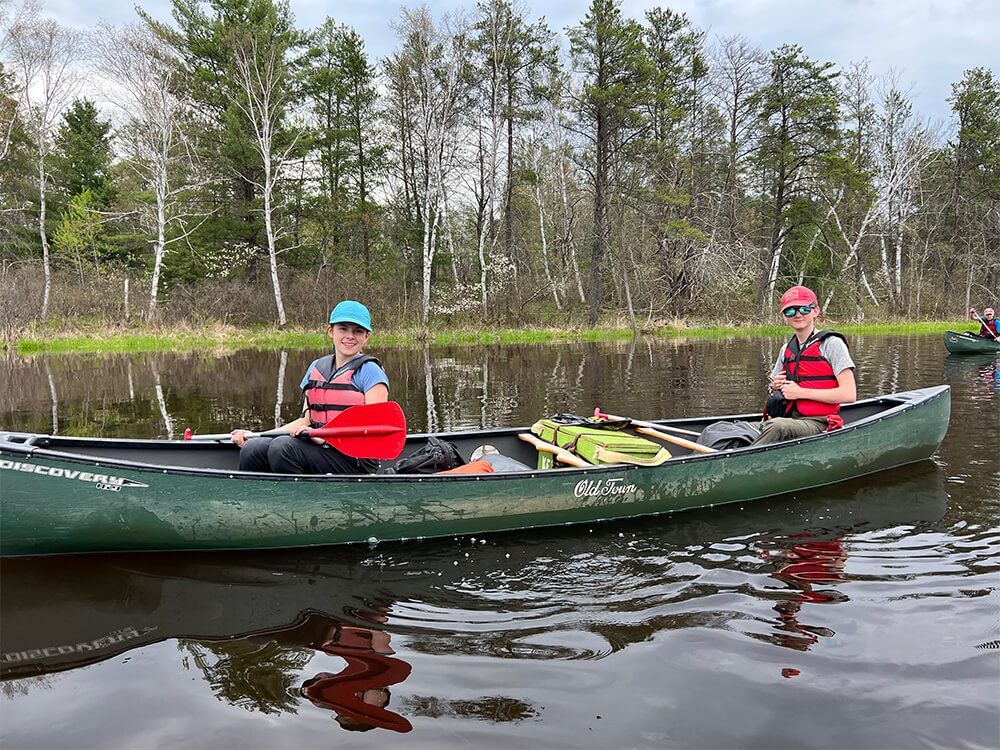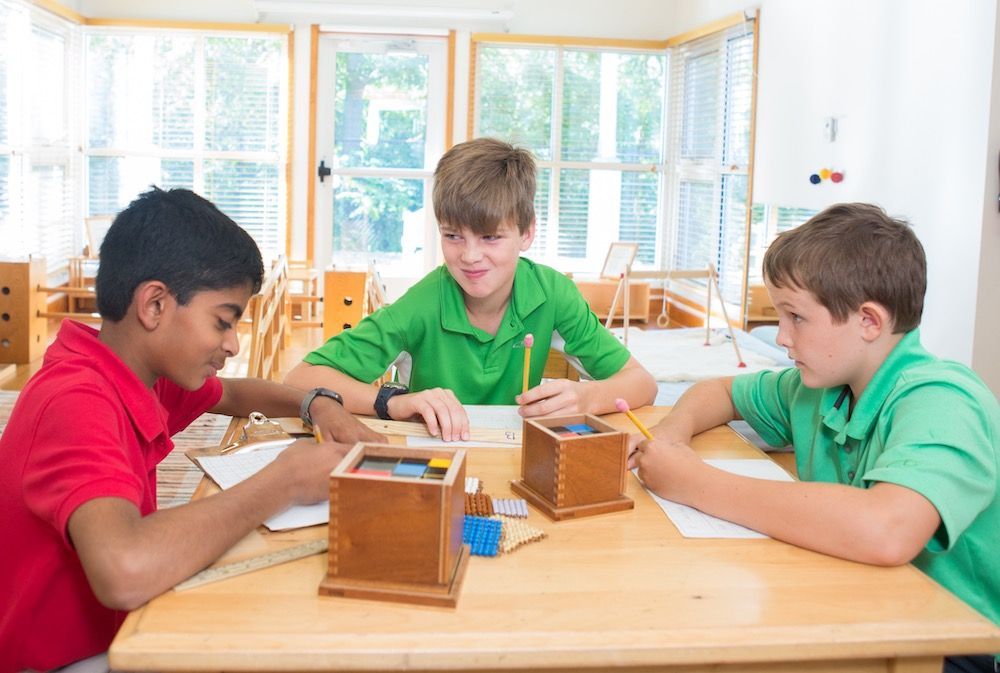
This is the final installment of our spring blog series, Montessori and Executive Functioning.
In Part I, we learned how a Montessori education helped Forest Bluff alumni to develop skills such as sustained attention, task initiation, organization, time management, and planning/prioritization. In Part II, alumni share how their schooling contributed to the development of their response inhibition, working memory, emotional control, flexibility, and goal-directed persistence. In Part III, the role of metacognition is discussed.
Metacognition: the ability to consider and evaluate one’s own thinking processes
Over the course of the creation of this piece, I had the opportunity to speak to many Montessori alumni. I was struck by how, after seeing the list of traits, each one could so easily speak about their executive functioning skills. Every single one was able to choose a topic to discuss. And despite being in the middle of exams, or homework, or their own full lives, they were able to share organized and concise thoughts about their thinking processes, whether it was task initiation, goal-directed persistence, sustained attention, or any of the executive functioning skills.
In this way, every alumni I interviewed displayed fluency with metacognition. They considered their thinking processes, and developed articulate and thoughtful analyses of their cognitive abilities. Not only were they able to consider these processes in the present, but they also were able to reflect on their childhood experiences, and relate their current thinking patterns to their Montessori education.
Perhaps this is the invitation for me to reveal that I, too, am a Montessori alumni. I deeply appreciate the importance of metacognition. Without an understanding of our thinking processes, we cannot properly evaluate where we need more support, or how to individually structure projects so that we have the best chance of success given our strengths and weaknesses. As I observed during my interview with the young woman about sustained attention, executive functioning traits do not simply exist fully formed in every person. Instead, we need to understand which tools to use when in order to fully utilize our skills. Metacognition makes this possible.
Montessori uniquely provides an environment for developing metacognition. From a very young age, students are making choices and living with the consequences of those choices, giving themselves opportunities to assess their decisions and their approaches to their work. When they are very little, this process is implicit. But after the age of six, they record their work in a work journal—their entries becoming more elaborate and specific as they mature—and then they have a weekly meeting with their teacher where they consider their work progress, and make plans for what they’d like to accomplish in the coming week.
This cycle of freedom and reflection gives students the space to experiment with their work habits, and then assess how it went under the guidance of a trained teacher. They are not simply told what they did right or wrong. They are part of a regular conversation that considers their individual strengths and weaknesses, and then they are given the liberty to begin their next week with new ideas of how to accomplish the work they’d like to accomplish. This lays the foundation for metacognition.
Final Thoughts
As I read through the conversations I had with each of these students and parents, I see three important themes.
Freedom and Responsibility
First, the balance of freedom and accountability (or responsibility, as the Montessori language often uses) is a foundational element for almost every single skill related to executive functioning. Perhaps obviously, in order to develop the ability to make good choices and plans, a person needs a lot of practice making good choices and plans, preferably starting in their childhood. They need to choose what to work on and how to work on it, and also have the space to make mistakes and learn from their choices. Then they need the freedom to choose it again, and to do it differently next time.
No matter how many choices a conventional school introduces to the day, it is virtually impossible for them to replicate the intricate and widespread presence of freedom and accountability in the Montessori curriculum. This is partially because it is not enough to simply give the children freedom. They also need specific, regular, and natural opportunities to get feedback on their decisions, whether they learn from the materials, their peers, or conversations with their teacher. They have to have the freedom to make choices, and the necessary structure to learn from those choices. This is how executive functioning skills flourish.
A Cohesive and Comprehensive Curriculum
Second, Dr. Montessori’s cohesive curriculum supports executive functioning through an entire childhood—from the time the tiny toddler enters the Young Children’s Community until the long-limbed adolescent plans for a semester-long independent study project and prepares a meal for their entire class without a teacher’s help. It does this by gradually expanding the size of the projects while giving children organic checkpoints to assess their decisions and projects. One mother who I spoke to observed the ways this takes place throughout the years:
It goes all the way back to the YCC and the Primary because the children are choosing their own work then, too. They may get out a lengthy activity like table washing right before the end of the day. They set it up and then see their classmates cleaning up their work. They experience the trial and error of what fits into the time they have at their disposal.
In the Primary, they choose their activities and fill their time. In the Elementary, they record the time it takes to do work and reflect on it. Then in the Secondary Level, they make plans for the future.
The children do so many long term projects in Montessori. They not only experience what they did during a certain day, but they also have to manage how to get through a long project. Are they keeping up with their friends who are working on the same project? Are they staying on track for the goals they set for themselves? There’s a constant juxtaposition between the large scale work period and the smaller scale work periods.
These larger scale work periods and smaller scale work periods are an essential element of the Montessori curriculum. Learning to navigate this balance over the years creates an important foundation for executive functioning.
Celebrating Individuality
Finally, and perhaps most significantly, is the respect that Montessori has for the extraordinary individuality of every human being. It not only acknowledges it and supports it, but it also recognizes that our world needs human beings with profoundly different strengths. These executive functioning skills do not all exist fully formed in 8th grade Montessori graduates. The seeds have been planted, so to speak, but it will take time for them all to flourish. Montessori does not produce or polish or make anything in graduates.
The academic and holistic curriculum gives children the gifts of deeply rooted awareness, confidence, and experience as autonomous beings with goals. But, given that every person is an individual with unique strengths and challenges, they all will come to the impressive executive functioning that Montessori promises in their own time. Similarly, each skill will show up uniquely in each person. One graduate will exhibit “sustained attention” in a different way from another graduate. In my interview, our sophomore college student sustains her attention through organization and motivation. Someone else might use other habits to arrive at the same place. The beauty of Montessori is that it provides just enough structure for a person to keep building their own scaffolding as they grow into the world and develop their own habits and goals.
The alumni mother who I spoke to shared her thoughts on this: “It is unusual for a system of education to simultaneously indulge personality discrepancies and also correct for weaknesses. Montessori doesn’t extinguish divergences in students. It allows us to hold on to the best parts of what made us all different while also holding us accountable for the ways we needed to be productive and accomplished.”
Truly, the goal of a Montessori education is not to produce graduate after graduate who all exhibit the same executive functioning skills in the same way. It is to elevate natural strengths and help provide structure and support for challenges. It is to maintain the individuality of each student, and preserve their confidence and love of learning, while also allowing them to develop the tools necessary to thrive in the world.
The goal of a Montessori education is to sustain a reverence for the dignity of every human being, and provide a path for each of them to offer their own essential gifts to the unfolding of the universe.
References
Guare, R., Dawson, P., & Guare, C. (2013). Smart but Scattered Teens. The Guilford Press.
Moffitt, T., Arseneault, L., Belsky, D., Dickson, N., Hancox, R., Harrington, H., Houts, R., Poulton, R., Roberts, B., Ross, S., Sears, M., Thomson, W., & Caspi, A. (2011). A gradient of childhood self-control predicts health, wealth, and public safety. Proceedings of the National Academy of Sciences, 108(7), 2693-2698. https://doi.org/10.1073/pnas.1010076108
Randolph, J., Bryson, A., Menon, L., Henderson, D., Manuel, A., Michaels, S., Rosenstein, D., McPherson, W., O'Grady, R., & Lillard, A. (2023). Montessori education's impact on academic and nonacademic outcomes: A systematic review. Campbell Systematic Reviews, 19(3). https://doi.org/10.1002/cl2.1330


